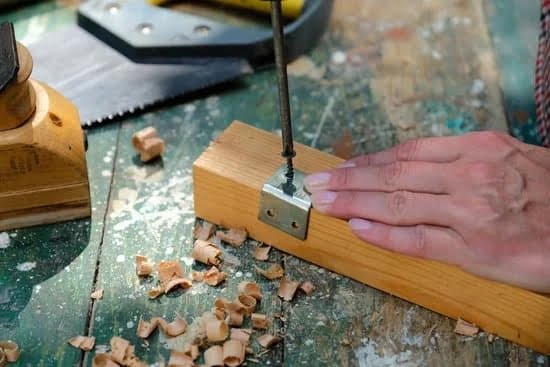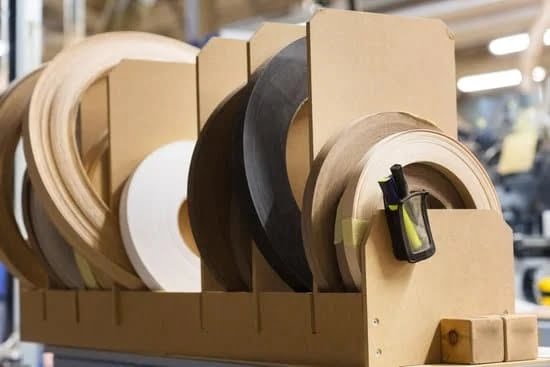Woodworking is a skill that has been passed down through generations, allowing craftsmen to create beautiful and functional pieces from wood. However, many people may find themselves with woodworking tools that they no longer need or use.
Rather than letting them collect dust in the garage, these tools can be donated to help support and inspire the next generation of craftsmen. By donating woodworking tools, individuals can make a meaningful impact by providing resources for aspiring woodworkers and supporting community organizations dedicated to promoting craftsmanship.
Donating woodworking tools is not just about getting rid of unwanted items; it is about giving back and making a difference. The act of donating allows individuals to contribute to the growth and development of future craftsmen who may not have the means to acquire expensive tools. By sharing their resources, experienced woodworkers can inspire others to pursue their passion for woodworking and carry on the legacy of craftsmanship.
There are numerous organizations and programs that accept woodworking tool donations, both locally and nationally. Local nonprofit organizations often support vocational schools, training programs, and community centers that provide education and resources for aspiring woodworkers. National charities also play a crucial role in distributing donated tools to those in need across the country. Additionally, online platforms and forums connect woodworkers in need with individuals willing to donate their unused tools.
In the following sections of this article, we will explore the importance of donating woodworking tools in more depth. We will discuss how donations support the next generation of craftsmen by providing them with necessary resources.
Furthermore, we will explore where individuals can donate their woodworking tools locally through nonprofits, nationally through charities, as well as ways to connect with those in need through online platforms and forums. Finally, we will delve into tax benefits associated with tool donations and provide tips for preparing and ensuring donation success.
The Importance of Donating Woodworking Tools
Woodworking is an art form that requires skill, creativity, and precision. It is a craft that has been passed down from generation to generation, and it is important to preserve and support the next generation of craftsmen. Donating woodworking tools can play a significant role in this endeavor.
Preserving Craftsmanship
Woodworking is not just a hobby; it is a valuable skill that can provide individuals with a sense of accomplishment and pride. By donating woodworking tools, you are helping to preserve craftsmanship and ensuring that these skills continue to be passed down.
Young aspiring craftsmen may not have the means to purchase expensive tools or may lack access to resources for learning the craft. Your donation can provide them with the opportunity and tools they need to hone their skills and carry on the tradition of woodworking.
Access to Resources
Donating woodworking tools also helps provide access to resources for those who may not have them otherwise. Many individuals or organizations cannot afford new tools, especially when starting out as beginners or working on community projects. By donating your unused or unwanted woodworking tools, you are ensuring that these resources are accessible to those who need them most. This access can be crucial in fostering creativity, passion, and engagement in woodworking activities.
Fostering Creativity and Education
In addition to preserving craftsmanship, donating woodworking tools can foster creativity and education within the community. Woodworking is often taught in vocational schools, training programs, or workshops where individuals learn valuable skills for future employment opportunities.
Your tool donations allow these educational institutions to equip their students with essential resources for learning and practicing woodworking techniques. By providing them with the necessary materials, you are giving students the chance to experiment with different projects, explore their creativity, and develop new ideas.
Where to Donate Woodworking Tools
Local nonprofit organizations are an excellent option for individuals looking to donate their woodworking tools. These organizations often have a strong connection with the local community and focus on providing resources and support to craft enthusiasts, students, and aspiring craftsmen. Donating to these organizations ensures that your tools will be put to good use and benefit those who may not have access to quality equipment.
There are several local nonprofit organizations that accept woodworking tool donations across the country. One such organization is the Woodworkers Guild of America (WWGOA), which has chapters in various states. The WWGOA aims to promote woodworking education and provides resources, classes, and workshops for its members. They often accept tool donations to replenish their inventory and support their educational programs.
Another option is to reach out to local vocational schools or trade programs that offer woodworking courses. These institutions are always in need of tools for their students, as they rely on donated equipment to provide hands-on training. By donating your woodworking tools to a nearby school or program, you can directly contribute to the development of future craftsmen.
Donating your woodworking tools to local nonprofit organizations not only supports the growth and education of aspiring woodworkers but also helps strengthen your community. It allows individuals who may not have the financial means or access to expensive equipment an opportunity to pursue their passion for crafting. Additionally, it promotes sustainability by reducing waste and extending the useful life of tools that might otherwise end up discarded.
Tools for Change
Habitat for Humanity
Habitat for Humanity is a well-known national charity that accepts woodworking tool donations. They have a ReStore program which sells donated items at discounted prices to fund their home-building projects. Donating your woodworking tools to Habitat for Humanity not only supports their mission of providing affordable housing, but also helps aspiring craftsmen and individuals who cannot afford brand new tools.
Tools for Troops
If you’re looking to donate your woodworking tools to a cause that supports veterans, then Tools for Troops is an excellent choice. This national charity collects and distributes donated tools to veterans who are transitioning into civilian life or pursuing careers in the trades. By donating your tools, you can make a meaningful impact on the lives of these individuals and support their journey towards independence.
The Woodworker’s Alliance for Disaster Relief
The Woodworker’s Alliance for Disaster Relief is a nonprofit organization that responds to natural disasters by providing assistance with rebuilding efforts. Their focus is on helping communities recover by providing skilled volunteers and resources, including woodworking tools. By donating your woodworking tools to this organization, you can directly contribute to disaster relief efforts and assist in rebuilding communities affected by catastrophic events.
These national charities are just a few examples of organizations that accept woodworking tool donations. It’s important to research each organization’s specific requirements before making a donation to ensure that your contribution will be put to good use. Remember, these charities rely on the generosity of donors like yourself to continue their impactful work, so donating your unused or unwanted woodworking tools can truly make a difference in someone’s life.
Giving Back to the Community
Donating woodworking tools to vocational schools and training programs is a meaningful and impactful way to give back to the community. These institutions play an important role in shaping the next generation of craftsmen, providing them with the skills and knowledge needed to pursue careers in woodworking and other related fields. By donating tools to these programs, you can help ensure that students have access to the resources they need to learn and grow as artisans.
Vocational schools and training programs rely on donations from individuals and businesses to maintain their workshops and provide students with hands-on experience. Woodworking tools are often expensive, making it challenging for these institutions to keep their inventory well-stocked. By donating your gently used or new tools, you can directly support the education of aspiring woodworkers, giving them opportunities they may not have had otherwise.
When considering which vocational schools or training programs to donate your woodworking tools to, it’s essential to research local options in your area. Look for organizations that have a strong curriculum, dedicated teachers, and a commitment to promoting craftsmanship. Reach out directly to these institutions or contact local trade associations for guidance on where your donation would make the most significant impact.
Remember that before donating your tools, it’s crucial to properly clean, organize, and prepare them for delivery. This ensures that they are ready for immediate use by students and reduces any additional workload for staff at the receiving institution. Additionally, if possible, include any relevant manuals or instructional materials that may accompany the donated tool.
Recycling and Reusing
Woodworking tools have a long lifespan and can be used by multiple generations of craftsmen. However, there may come a time when you no longer need or use your woodworking tools. Instead of letting them gather dust in your workshop or throwing them away, consider donating them to reduce waste and help others in the woodworking community.
Donating woodworking tools is an excellent way to recycle and reuse these valuable resources. When you donate your woodworking tools, you give them a second life and prevent them from ending up in landfills. By doing so, you contribute to reducing environmental impact and promote sustainable practices.
There are several organizations and programs that accept woodworking tool donations. Local nonprofit organizations such as community centers, schools, or maker spaces often appreciate these donations as they can provide access to tools for aspiring craftsmen who may not be able to afford their own. Additionally, vocational schools and training programs rely on donated tools to teach their students practical skills and prepare them for future employment opportunities.
Another option for recycling and reusing woodworking tools is through online platforms and forums dedicated to connecting woodworkers in need of specific tools with those looking to donate. These platforms create an efficient way for woodworkers to find the necessary tools they need while ensuring that donated items go directly into the hands of individuals who will put them to good use.
By donating your woodworking tools, you not only contribute to reducing waste but also provide valuable resources for craftsmen in need. Additionally, many countries offer tax benefits for charitable donations, including woodworking tool contributions. Be sure to check the local tax laws or consult with a professional accountant to understand any potential tax benefits associated with your donation.
Before making a donation, it is essential to prepare your woodworking tools properly. Clean them thoroughly, sharpen blades if necessary, and organize them neatly in appropriate storage containers or boxes. It is also helpful to include any relevant information about the condition or functionality of each tool when donating.
Online Platforms and Forums
In today’s digital age, online platforms and forums have become valuable resources for connecting woodworkers who are in need of tools with individuals looking to donate. These online communities provide a convenient and efficient way to exchange information, connect with like-minded individuals, and facilitate tool donations.
One popular online platform for donating woodworking tools is the Woodworking Charity Hub. This website serves as a centralized hub where woodworkers can post their tools for donation and connect with those in need. Users can browse through the listings to find specific types of tools or filter by location to support local woodworkers. The platform also allows users to communicate directly with each other to arrange pick-up or shipping details.
Another option is joining woodworking forums such as WoodNet or Sawmill Creek. These forums have dedicated sections where users can post about tools they no longer need and offer them up for donation. It’s important to read the rules and guidelines of these forums before posting to ensure proper etiquette and adherence to community guidelines.
When using online platforms and forums, it’s essential to be transparent about the condition of the tools you are donating. Provide accurate descriptions and clear photographs so potential recipients know what they’re getting. Additionally, consider including any relevant accessories or supplies that may accompany the tools.
Overall, online platforms and forums are excellent resources for connecting with woodworkers in need of tools. Through these digital communities, you can easily find individuals who will benefit from your donated items, promoting sustainability within the woodworking community.
Tax Benefits
Donating woodworking tools not only supports the next generation of craftsmen but can also provide you with tax benefits. When you donate your tools to qualified charitable organizations, you may be eligible for a tax deduction. This can help offset the cost of new tools or other expenses related to your woodworking hobby.
Under the United States tax code, individuals who itemize their deductions can claim a deduction for the fair market value of donated property, including woodworking tools. It’s important to note that in order to claim this deduction, you must donate your tools to a qualified nonprofit organization that is recognized as tax-exempt by the Internal Revenue Service (IRS).
To determine the value of your donated woodworking tools, it’s advisable to consult with an appraiser or refer to resources such as online valuation guides. The IRS requires that you substantiate the fair market value of donated property, so keeping documentation such as receipts and appraisal reports is essential. Additionally, if your donation exceeds $500 in value, you may need to complete Form 8283 and attach it to your tax return.
Beyond potential tax benefits, donating woodworking tools allows you to declutter your workspace and make room for new equipment. By giving away tools you no longer use or need, you’re contributing to sustainability efforts by promoting reuse and reducing waste. Plus, knowing that your old tools are being put into good hands and helping others pursue their passion for woodworking can bring a sense of fulfillment and satisfaction.
Considerations When Donating
When it comes to donating woodworking tools, it is important to take certain considerations into account to ensure that your donation is valuable and beneficial. Follow these tips for preparing and ensuring the success of your tool donation:
Firstly, before donating your woodworking tools, make sure they are in good working condition. Nonprofit organizations, vocational schools, and training programs often rely on donated tools to provide valuable resources for aspiring craftsmen. By offering tools that are functional and well-maintained, you can make a significant impact on the next generation of woodworkers.
Additionally, it is essential to clean and organize the tools before donating them. This not only showcases the respect and care you have given to your equipment but also makes it easier for organizations or individuals receiving the tools to distribute them efficiently. Taking the time to wipe off any dirt or sawdust will greatly enhance the overall value of your donation.
Furthermore, consider including any additional accessories or safety equipment that may accompany your woodworking tools. For instance, if you have spare saw blades or goggles that go unused, including them with your tool donation can greatly benefit those who may not have access to such items otherwise.
Lastly, document the donation process by taking pictures or making a list of all the tools you’re giving away. This documentation can serve as proof for potential tax deductions and help you keep track of your contributions over time.
In conclusion, by considering these factors when preparing and ensuring the success of your tool donation, you can make a powerful impact on woodworking enthusiasts in need while also promoting sustainability within the craft. Remember that every donated tool has the potential to support aspiring craftsmen, reduce waste, and foster a sense of community within woodwork circles.
Frequently Asked Questions
What can I do with old or unused tools?
When you have old or unused tools, there are several options for what you can do with them. One possibility is to donate them to a local trade school, vocational program, or community organization that could benefit from the tools. Many of these organizations rely on donations to provide hands-on training and education to their students or members.
Another option is to sell your old tools online through platforms such as eBay, Craigslist, or specialized tool resale websites. This can help you recoup some of the initial investment while giving someone else the opportunity to put those tools to good use. Finally, if the tools are broken, damaged beyond repair, or simply not in a condition to be donated or sold, you may want to consider recycling them at a local recycling center that accepts metal items.
Does anyone collect old tools?
Yes, there are enthusiasts who collect old tools as a hobby. These collectors often appreciate the craftsmanship and historical value of antique and vintage tools. They may focus on specific types of tools, such as woodworking planes, blacksmithing tools, or hand drills.
Some collectors display their collections in dedicated workshops or create showcases in their homes to highlight the beauty and uniqueness of these old tools. Collecting old tools can also involve researching their origins and history, attending tool auctions or flea markets in search of rare finds, and even restoring the tools back to their original condition.
What can I do with extra tools?
If you have extra tools that are still in good working condition but no longer needed or used frequently, there are various ways you can make use of them. One option is to lend them to friends, family members, or neighbors who may have a temporary need for specific tools but don’t want to purchase them outright. By sharing your extra tools with others who would benefit from using them, you promote resourcefulness and save them from potentially buying duplicates unnecessarily.
Additionally, consider offering your extra tools for temporary loan through online community platforms focused on tool sharing and lending networks – this way, you can connect with individuals in your area who need tools for short-term projects. Lastly, if you have sufficient storage space and are inclined towards DIY or home improvement projects, keeping extra tools as backups or spares might come in handy when a tool breaks down unexpectedly.

Hi everyone! I’m a woodworker and blogger, and this is my woodworking blog. In my blog, I share tips and tricks for woodworkers of all skill levels, as well as project ideas that you can try yourself.





